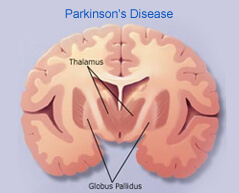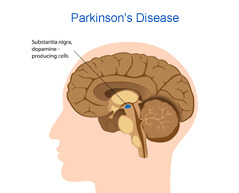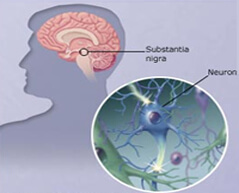Parkinson's Disease
 Parkinson's disease is a progressive disorder of the nervous system that affects your movement. It develops gradually, sometimes starting with a barely noticeable tremor in just one hand. But while a tremor may be the most well-known sign of Parkinson's disease, the disorder also commonly causes stiffness or slowing of movement.
Parkinson's disease is a progressive disorder of the nervous system that affects your movement. It develops gradually, sometimes starting with a barely noticeable tremor in just one hand. But while a tremor may be the most well-known sign of Parkinson's disease, the disorder also commonly causes stiffness or slowing of movement.
In the early stages of Parkinson's disease, your face may show little or no expression or your arms may not swing when you walk. Your speech may become soft or slurred. Parkinson's disease symptoms worsen as your condition progresses over time.
Although Parkinson's disease can't be cured, medications may markedly improve your symptoms. In occasional cases, your doctor may suggest surgery to regulate certain regions of your brain and improve your symptoms.
Parkinson's disease (PD) is a neurodegenerative brain disorder that progresses slowly in most people. Most people's symptoms take years to develop, and they live for years with the disease.
In short, a person's brain slowly stops producing a neurotransmitter called dopamine. With less and less dopamine, a person has less and less ability to regulate their movements, body and emotions.
Parkinson's disease itself is not fatal. However, complications from the disease are serious; the Center for Disease Control rated complications from PD as the 14th top cause of death in the United States.
 Normally, there are brain cells (neurons) in the human brain that produce dopamine. These neurons concentrate in a particular area of the brain, called the substantia nigra. Dopamine is a chemical that relays messages between the substantia nigra and other parts of the brain to control movements of the human body. Dopamine helps humans to have smooth, coordinated muscle movements. When approximately 60 to 80% of the dopamine-producing cells are damaged, and do not produce enough dopamine, the motor symptoms of Parkinson's disease appear. This process of impairment of brain cells is called neurodegeneration.
Normally, there are brain cells (neurons) in the human brain that produce dopamine. These neurons concentrate in a particular area of the brain, called the substantia nigra. Dopamine is a chemical that relays messages between the substantia nigra and other parts of the brain to control movements of the human body. Dopamine helps humans to have smooth, coordinated muscle movements. When approximately 60 to 80% of the dopamine-producing cells are damaged, and do not produce enough dopamine, the motor symptoms of Parkinson's disease appear. This process of impairment of brain cells is called neurodegeneration.
The current theory (so-called Braak's hypothesis) is that the earliest signs of Parkinson's are found in the enteric nervous system, the medulla and in particular, the olfactory bulb, which controls your sense of smell. Under this theory, Parkinson's only progresses to the substantia nigra and cortex over the years. This theory is increasingly borne out by evidence that non-motor symptoms, such as a loss of sense of smell, hyposmia, sleep disorders and constipation may precede the motor features of the disease by several years. For this reason, researchers are increasingly focused on these "non-motor" symptoms to both detect PD as early as possible and to look for ways to stop its progression.

Planning your medical trip to India is a very simple process with Spine and Neuro Surgery Hospital India
- You just need to fill in our enquiry form and one of our executive will contact you soon.
- +91-9325887033 Call us at the given to contact number for any assistance.
- Complete information regarding surgery is provided on our website.
Parkinson's disease (PD) is a type of movement disorder. It happens when nerve cells in the brain don't produce enough of a brain chemical called dopamine. Sometimes it is genetic, but most cases do not seem to run in families. Exposure to chemicals in the environment might play a role.
Symptoms begin gradually, often on one side of the body. Later they affect both sides. They include
- Symptoms begin gradually, often on one side of the body. Later they affect both sides. They include
- Trembling of hands, arms, legs, jaw and face
- Stiffness of the arms, legs and trunk
- Slowness of movement
- Poor balance and coordination
As symptoms get worse, people with the disease may have trouble walking, talking, or doing simple tasks. They may also have problems such as depression, sleep problems, or trouble chewing, swallowing, or speaking.
There is no lab test for PD, so it can be difficult to diagnose. Doctors use a medical history and a neurological examination to diagnose it.
PD usually begins around age 60, but it can start earlier. It is more common in men than in women. There is no cure for PD. A variety of medicines sometimes help symptoms dramatically. Surgery and deep brain stimulation (DBS) can help severe cases. With DBS, electrodes are surgically implanted in the brain. They send electrical pulses to stimulate the parts of the brain that control movement.
Parkinson's disease symptoms and signs may vary from person to person. Early signs may be mild and may go unnoticed. Symptoms often begin on one side of your body and usually remain worse on that side, even after symptoms begin to affect both sides.
Parkinson's signs and symptoms may include:
 Tremor. Your tremor, or shaking, usually begins in a limb, often your hand or fingers. You may notice a back-and-forth rubbing of your thumb and forefinger known as a pill-rolling tremor. One characteristic of Parkinson's disease is a tremor of your hand when it is relaxed (at rest).
Tremor. Your tremor, or shaking, usually begins in a limb, often your hand or fingers. You may notice a back-and-forth rubbing of your thumb and forefinger known as a pill-rolling tremor. One characteristic of Parkinson's disease is a tremor of your hand when it is relaxed (at rest).- Slowed movement (bradykinesia). Over time, Parkinson's disease may reduce your ability to move and slow your movement, making simple tasks difficult and time-consuming. Your steps may become shorter when you walk, or you may find it difficult to get out of a chair. Also, you may drag your feet as you try to walk, making it difficult to move.
- Rigid muscles. Muscle stiffness may occur in any part of your body. The stiff muscles can limit your range of motion and cause you pain.
- Impaired posture and balance. Your posture may become stooped, or you may have balance problems as a result of Parkinson's disease.
- Loss of automatic movements. In Parkinson's disease, you may have a decreased ability to perform unconscious movements, including blinking, smiling or swinging your arms when you walk. You may no longer gesture when talking.
- Speech changes. You may have speech problems as a result of Parkinson's disease. You may speak softly, quickly, slur or hesitate before talking. Your speech may be more of a monotone rather than with the usual inflections. A speech-language pathologist may help improve your speech problems.
- Writing changes. Writing may appear small and become difficult.
- Medications may greatly reduce many of these symptoms. These medications increase or substitute for dopamine, a specific signaling chemical (neurotransmitter) in your brain. People with Parkinson's disease have low brain dopamine concentrations.
- In Parkinson's disease, certain nerve cells (neurons) in the brain gradually break down or die. Many of the symptoms are due to loss of neurons that produce a chemical messenger in your brain called dopamine. When dopamine levels decrease, it causes abnormal brain activity, leading to signs of Parkinson's disease.
The cause of Parkinson's disease is unknown, but several factors appear to play a role, including:
- Your genes. Researchers have identified specific genetic mutations that can cause Parkinson's disease, but these are uncommon except in rare cases with many family members affected by Parkinson's disease.
- However, certain gene variations appear to increase the risk of Parkinson's disease but with a relatively small risk of Parkinson's disease for each of these genetic markers.
- Environmental triggers. Exposure to certain toxins or environmental factors may increase the risk of later Parkinson's disease, but the risk is relatively small.
- In summary, more research needs to be done to identify the factors causing Parkinson's disease.
- Many changes occur in the brains of people with Parkinson's disease, including:
- The presence of Lewy bodies. Clumps of specific substances within brain cells are microscopic markers of Parkinson's disease. These are called Lewy bodies, and researchers believe these Lewy bodies hold an important clue to the cause of Parkinson's disease.
- A-synuclein is found within Lewy bodies. Although many substances are found within Lewy bodies, scientists believe the most important of these is the natural and widespread protein called alpha-synuclein. It's found in all Lewy bodies in a clumped form that cells can't break down. This is currently an important focus among Parkinson's disease researchers.
Risk factors for Parkinson's disease include:
- Age. Young adults rarely experience Parkinson's disease. It ordinarily begins in middle or late life, and the risk increases with age. People usually develop the disease around age 60 or older.
- Heredity. Having a close relative with Parkinson's disease increases the chances that you'll develop the disease. However, your risks are still small unless you have many relatives in your family with Parkinson's disease.
- Sex. Men are more likely to develop Parkinson's disease than are women.
- Exposure to toxins. Ongoing exposure to herbicides and pesticides may put you at a slightly increased risk of Parkinson's disease.
Hospitals such as hospital in Nagpur provide specialized treatment for Neuro treatment. The cost of surgery is comparatively quite low in Spine and Neuro Surgery Hospital.
Get Low Cost Parkinson's Disease Treatment in India
We offer free assistance to international patients to find best medical treatment in India. We offer low-cost, world-class medical treatment in India, coordinated by a team of experienced service industry professionals
Please post a query to know about low cost treatment options at top India hospitals
Click Here
